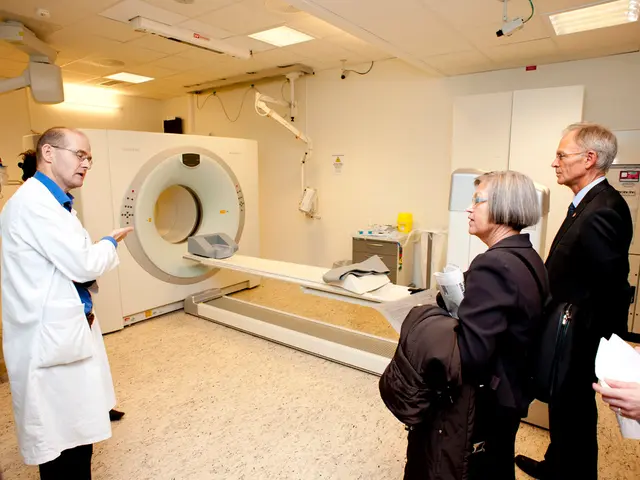Exploring therapies for C3 Glomerulopathy (C3G)
Kidney Mystery: Cracking the Code on C3 Glomerulopathy
C3 glomerulopathy (C3G) is a rare kidney condition that affects approximately 2 out of every 1 million people. This disease results in a buildup of protein deposits in the kidney's filtering tissues, causing impaired kidney function and even kidney failure over time. Unfortunately, there's no known cure for C3G yet. But fear not, researchers are hot on its trail!
The desire to halt C3G's progression drives current treatment methods. medical professionals focus on supporting kidney function and taming the immune system to slow down kidney damage. In the near future, emerging treatments will aim to snuff out C3G activity at the source within the complement system.
What the Heck is C3G?
C3G comes about due to an overactive immune system, primarily thanks to some problematic genes. These genes produce proteins crucial for managing the body's complement system, a part of the immune system that ensures its proteins stay in balance. When genes change, C3G results, with proteins becoming active too often, leading to excess C3 protein and subsequent damage to the kidney's glomeruli.
The glomeruli, blood vessels found within the kidneys, filter waste and extra fluids out of the blood. As C3 buildup occurs, these precious filters become increasingly damaged, making it challenging for the kidneys to filter toxins properly.
Apart from genetic changes, most C3G sufferers carry antibodies hindering the regular function of the complement system. While it's known that some family members with the disease share genetic links, it's not strictly inherited.
Treatment Time!
Since there's no cure for C3G, treatments aim to slow down kidney damage rather than curing the condition. Clinical guidelines from the Kidney Disease: Improving Global Outcomes (KDIGO) organization suggest supportive interventions for slowing and preventing kidney damage.
istry notes that kidney function begins to decline, doctors recommend immunosuppressive therapies like the following:
ACE Inhibitors and ARBs:
These medications lower blood pressure and help prevent proteinuria, a condition where protein leaks through the kidneys and into the urine.
Mycophenolate Mofetil (MMF) and Glucocorticoids:
These immune-suppressing medications are recommended if a person has had declining kidney function for at least 6 months or if they exhibit other signs of C3G progression, such as increasing protein levels in the urine.
Complement Inhibitors:
Doctors might suggest these meds to treat C3G if traditional immunosuppressants prove ineffective. Eculizumab and ravulizumab are monoclonal antibodies that curb complement system activity, focusing on the terminal pathway causing cell death during the innate immune response.
The effectiveness of eculizumab has, however, been mixed.
Dietary Considerations:
Eating a diet low in sodium, potassium, and phosphorus can lighten the load on the kidneys. Balancing protein and healthy fats with sensible fluid intake is also essential. Some folks with kidney conditions may benefit from working with a dietitian to create a diet plan that suits their needs.
Breakthroughs on the Horizon
shed light on promising new treatments for C3G currently in various stages of clinical trials, including:
- Pegcetacoplan (targets C3)
- ARO-C3 (targets C3)
- iptacopan (targets factor B)
- danicopan (targets factor D)
- avacopan (targets C5a)
- KP104 (targets C3 and C5)
- narsoplimab (targets MASP-2)
These new therapies work by interfering with the complement system's series of events leading to the activation or breakdown of C3 or other proteins, potentially halting C3G's harmful effects on the kidneys.
The future looks a whole lot brighter with the recent approval of iptacopan as the first treatment specifically for adults with C3G. Iptacopan inhibits the alternative complement pathway by targeting factor B, addressing the root cause of complement overactivation in C3G. This approval comes after positive results from the phase 3 APPEAR-C3G clinical trial, which showed iptacopan effectively reduced proteinuria after 6 months of treatment compared to placebo.
Additionally, pegcetacoplan, a C3/C3b inhibitor, received FDA Priority Review for treating C3G and IC-MPGN. Pegcetacoplan aims to inhibit complement activation at the level of C3, thereby preventing subsequent kidney damage.
As the landscape of C3G treatment evolves, we're moving toward targeted therapies that address the disorder's root causes rather than just treating its symptoms. The future promises safer, more precise options than traditional immunosuppressants for both C3G and IC-MPGN sufferers. Keep watching this space!
- C3 glomerulopathy (C3G) is an uncategorized medical-condition within the realm of chronic diseases, affecting about 2 individuals out of every million.
- C3G is a kidney disease characterized by the buildup of protein deposits in filtering tissues, caused by an overactive immune system due to problematic genes and antibodies hindering regular complement system function.
- Glomerulopathy refers to a group of disorders that affect the glomeruli in the kidneys, blood vessels responsible for filtering waste and extra fluids from the blood.
- Science is currently focused on developing therapies-and-treatments to slow down C3G's progression, including immunosuppressive therapies like ACE inhibitors, ARBs, Mycophenolate Mofetil (MMF), Glucocorticoids, and Complement Inhibitors.
- Health-and-wellness professionals emphasize the importance of diet, such as low sodium, potassium, and phosphorus foods for individuals with C3G to ease the burden on their kidneys.
- Autoimmune-disorders, like C3G, are a subcategory of chronic diseases, indicating a malfunctioning immune system causing harm to the body's own tissues, including those in digestive-health, eye-health, hearing, cardiovascular-health, and neurological-disorders.
- Current treatments for C3G primarily address the symptoms rather than the root causes, but emerging treatments like Pegcetacoplan, ARO-C3, iptacopan, and KP104 are under investigation, aiming to halt C3G activity and potentially cure the disease.
- CBD (cannabidiol), a popular natural remedy lacks substantial scientific evidence to treat C3G symptoms or as a cure, unlike the aforementioned potential breakthrough therapies.
- The first treatment specifically for C3G, iptacopan, has recently been approved, inhibiting factor B to address the root cause of complement overactivation in C3G.
- Narsoplimab, another promising therapy, targets MASP-2, interfering with the complement system, while therapies like avacopan, danicopan, and narsoplimab focus on various factors to disrupt the complement system's series of events and halt C3G's harmful effects on the kidneys.
- Respiratory-conditions, skin-conditions, and cancers are unrelated to C3G and the complement system, as C3G specifically involves the kidneys, although they may share similarities in underlying mechanisms with chronic diseases like C3G within the immune system.








